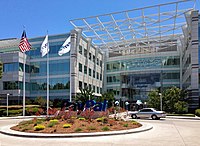
Photo from wikipedia
Objectives: To describe peer-assisted learning (PAL) groups formed by dental undergraduate students in a biomedical course and to investigate the association of individual and group characteristics with academic performance. Subjects… Click to show full abstract
Objectives: To describe peer-assisted learning (PAL) groups formed by dental undergraduate students in a biomedical course and to investigate the association of individual and group characteristics with academic performance. Subjects and Methods: In 2015, 92 fourth-year students (43 males and 49 females) in the College of Dentistry, University of Dammam, Saudi Arabia, were invited to form PAL groups to study a unit of a biomedical course. An examination was used to assess their knowledge after 2 weeks. In addition, a questionnaire and social network analysis were used to investigate (1) individual student attributes: gender, role, subject matter knowledge, grade in previous year, teaming with friends, previous communication with teammates, and content discussion, and (2) group attributes: group teacher's previous grade, number of colleagues with whom a student connected, teaming with friends, similarity of teammates' previous grades, and teacher having higher previous grades than other teammates. Regression analysis was used to assess the association of examination scores with individual and group attributes. Results: The response rate was 80.4% (74 students: 36 males and 38 females). Students who previously scored grades A and B had higher examination scores than students with grades C/less (regression coefficient = 18.50 and 13.39) within the groups. Higher scores were not associated with working in groups including friends only (regression coefficient = 1.17) or when all students had similar previous grades (regression coefficient = 0.85). Conclusions: Students with previous high grades benefited to a greater extent from working in PAL groups. Similarity of teammates in PAL groups was not associated with better scores.
Journal Title: Medical Principles and Practice
Year Published: 2017
Link to full text (if available)
Share on Social Media: Sign Up to like & get
recommendations!